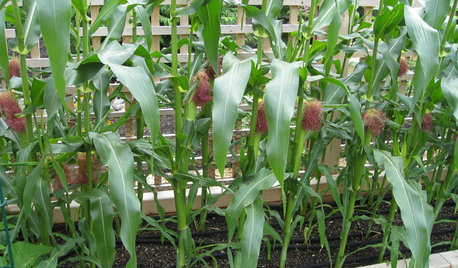Do GMO crops increase yields?
peter_6
14 years ago
Related Stories

EDIBLE GARDENSSummer Crops: How to Grow Tomatoes
Plant tomato seedlings in spring for one of the best tastes of summer, fresh from your backyard
Full Story
EDIBLE GARDENSHow to Grow Your Own Sweet Summer Crops
This guide will help any gardener get started on growing the freshest warm-season veggies and berries for summer
Full Story
SUMMER FRUITS AND VEGETABLESHow to Grow Your Own Fresh, Sweet Corn
Here's how to plant and care for your own mini cornfield
Full Story
FARM YOUR YARDHello, Honey: Beekeeping Anywhere for Fun, Food and Good Deeds
We need pollinators, and they increasingly need us too. Here, why and how to be a bee friend
Full Story
HEALTHY HOME6 Tips From a Nearly Zero-Waste Home
Lower your trash output and increase your quality of life with these ideas from a mom who did it to the max
Full Story
GARDENING GUIDES6 Ways to Grow Edibles in Small Places
No big backyard? Join in the grow-your-own fun with these small-space ideas for planting vegetables, fruits and herbs
Full Story
EARTH DAYHow to Design a Garden for Native Bees
Create a garden that not only looks beautiful but also nurtures native bees — and helps other wildlife in the process
Full Story
GARDENING GUIDESEssential Watering Tips for Your Edible Garden
To give your edible plants just what they need, check out these guidelines for how, when and how much to water
Full Story
GARDENING GUIDESCalifornia Gardener's August Checklist
Share the veggie wealth, help plants sip smartly and don't forget to enjoy the simple pleasure of relaxing in your garden
Full Story
FARM YOUR YARD6 Things to Know Before You Start Growing Your Own Food
It takes time and practice, but growing edibles in the suburbs or city is possible with smart prep and patience
Full StorySponsored
Custom Craftsmanship & Construction Solutions in Franklin County



Kimmsr
farmboy66
Related Discussions
Why We Need Mandatory GMO Food Labels
Q
Which of our food crops are mostly GMO?
Q
Increase yield with Mycorrhiza innoculation
Q
Using ants and termites to increase crop yields
Q
Dan _Staley (5b Sunset 2B AHS 7)
anney
anney
Dan _Staley (5b Sunset 2B AHS 7)
anney
farmersteve
rj_hythloday
Dan _Staley (5b Sunset 2B AHS 7)
Michael
Kimmsr
Dan _Staley (5b Sunset 2B AHS 7)
Michael
anney
Dan _Staley (5b Sunset 2B AHS 7)
anney
Dan _Staley (5b Sunset 2B AHS 7)
anney
Dan _Staley (5b Sunset 2B AHS 7)
anney
bobbic
takadi
peter_6Original Author
Dan _Staley (5b Sunset 2B AHS 7)